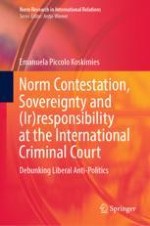2022 | OriginalPaper | Buchkapitel
4. Shaping Sovereignty as Responsibility at the ICC (Part II): The Test of Institutional Practice
verfasst von : Emanuela Piccolo Koskimies
Erschienen in: Norm Contestation, Sovereignty and (Ir)responsibility at the International Criminal Court
Aktivieren Sie unsere intelligente Suche, um passende Fachinhalte oder Patente zu finden.
Wählen Sie Textabschnitte aus um mit Künstlicher Intelligenz passenden Patente zu finden. powered by
Markieren Sie Textabschnitte, um KI-gestützt weitere passende Inhalte zu finden. powered by
